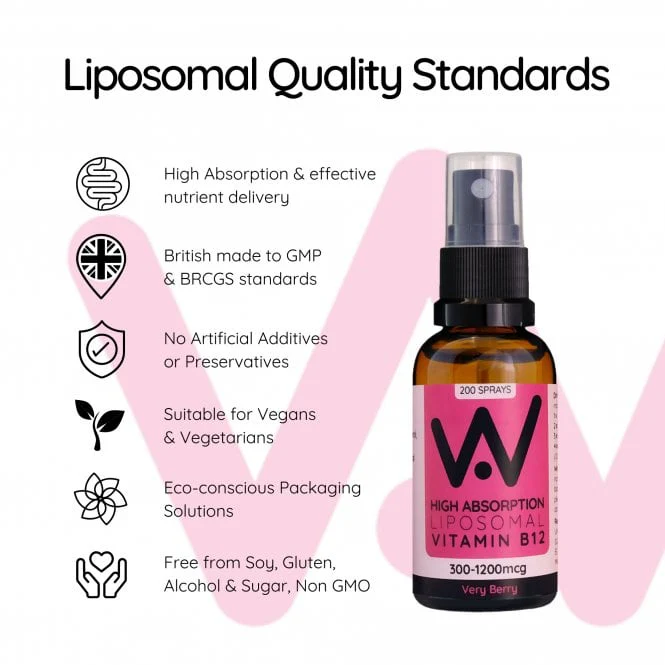Vitamin B12, also known as cobalamin, is an essential vitamin that plays a vital role in the functioning of the brain and nervous system, as well as in the formation of blood and various proteins. It is naturally found in animal products such as meat, eggs, and dairy, and is crucial for processes like DNA synthesis and cellular energy production. The body stores a significant amount of vitamin B12 in the liver, but since it cannot be produced internally, adequate dietary intake is essential to prevent deficiency. Deficiencies can lead to severe health issues, including anemia and neurological disorders.
About Vitamin B12
Vitamin B12 supplements come in several forms, with the most common being cyanocobalamin and methylcobalamin. These supplements are crucial for individuals who do not consume sufficient amounts from their diet, particularly vegetarians and the elderly, who may have trouble absorbing B12 from food. In recent years, a new form called liposomal B12 has emerged, claiming to offer enhanced absorption and efficacy. This article will delve into the traditional and liposomal forms of B12, comparing their benefits and mechanisms to help you determine which might be more beneficial for your health needs.
Understanding Liposomal B12
Liposomal B12 represents a novel approach to supplement delivery, where the vitamin B12 molecule is encapsulated within liposomes. Liposomes are tiny, spherical vesicles made up of cholesterol and naturally occurring phospholipids, similar to the composition of cell membranes. This design is intended to mimic the body’s natural cell structure, which theoretically enhances the delivery of B12 directly to the cells and tissues, bypassing certain digestive barriers that traditional supplements might face.
As per DianaMalcoci, owner of Health & Nutrition Concept Clinic in Dublin, “primary rationale behind the use of liposomal technology for vitamin B12 supplementation is to improve the bioavailability of the vitamin. Bioavailability refers to the proportion of a nutrient that is digested, absorbed, and metabolized through normal pathways. Traditional B12 supplements, while effective, often face challenges related to absorption, especially in individuals with certain gastrointestinal issues such as low stomach acid or intrinsic factor deficiency, a protein essential for B12 absorption.”
Liposomal B12 is often marketed as a superior form of B12 for its potential to provide faster and more efficient absorption. The liposomal encapsulation protects the vitamin from being degraded by the acidic environment of the stomach, thereby allowing more of it to be delivered intact to the intestines where it can be absorbed. This method is particularly advantageous for older adults and those with digestive impairments who are at higher risk for B12 deficiency.
Absorption Mechanisms: Traditional B12 vs Liposomal B12
The body’s absorption of Vitamin B12 is a complex process that requires several steps and can be affected by various physiological conditions. Traditional B12 supplements, such as cyanocobalamin or methylcobalamin tablets, must be ingested orally and pass through the digestive system. For B12 to be effectively absorbed in the gut, it needs to bind with a protein called intrinsic factor, which is produced in the stomach. This B12-intrinsic factor complex can then be absorbed by the small intestine. However, factors such as age, certain medications, and gastrointestinal diseases can reduce the production of intrinsic factor, thus hindering effective absorption.
In contrast, liposomal B12 is designed to enhance absorption by bypassing some of these preliminary steps. The liposomal encapsulation acts like a protective bubble around the B12 molecule, shielding it from gastric acids and enzymes that might degrade it before it reaches the absorption sites in the intestine. Once at the site, the liposomal membrane fuses with the cell membranes, facilitating a more direct and potentially more efficient transfer of B12 into the bloodstream.
This difference in delivery mechanism suggests that liposomal B12 could be significantly more effective for individuals with conditions that impair the normal absorption process, such as pernicious anemia, Crohn’s disease, or those who have undergone certain gastrointestinal surgeries. Moreover, the liposomal form may provide a more consistent serum level of B12, which can be particularly beneficial for maintaining steady energy levels and cognitive function.
By comparing these two mechanisms, we can begin to understand the potential advantages of liposomal technology in terms of increasing the bioavailability of supplements. Next, I will delve into comparing the efficacy of traditional and liposomal B12 based on current research findings. Let me know when to proceed.
Comparing Efficacy: Which Form is More Effective?
When considering the efficacy of traditional versus liposomal B12, it’s essential to look at the available scientific evidence and studies that compare the outcomes of using these different forms. Efficacy can be measured in terms of how well the vitamin is absorbed, how it improves B12 deficiency symptoms, and its overall impact on health.
Research indicates that the bioavailability of liposomal B12 might be higher than that of traditional forms due to its enhanced delivery system. Some studies have shown that liposomal encapsulation can lead to significantly higher serum levels of B12 in a shorter amount of time compared to standard forms. This suggests that liposomal B12 could be particularly effective for quickly correcting deficiencies.
However, it is important to note that traditional B12 supplements are still very effective for many individuals and have been used successfully for decades to treat and prevent B12 deficiency. These supplements are typically available in various forms, such as pills, sublingual tablets, or injections, with each form having its own absorption rate and efficacy. For instance, B12 injections bypass the digestive system entirely and provide an immediate increase in B12 levels, which is crucial for individuals with severe deficiencies or absorption disorders.
While liposomal B12 may offer an advantage in terms of absorption efficiency, especially in individuals with gastrointestinal issues, more comprehensive studies are needed to fully establish its superiority over traditional forms. Furthermore, the cost-effectiveness of liposomal B12 versus traditional supplements should also be considered, as the newer liposomal form can be more expensive.
Health Benefits of Vitamin B12
Vitamin B12 is crucial for several key physiological processes, making its adequate intake essential for maintaining good health. Its benefits span various aspects of bodily function, from cognitive health to energy production and beyond.
Cognitive Health and Nerve Function
B12 is integral in maintaining the health of nerve cells, including those needed for neurotransmitter signaling, which influences cognitive functions such as memory and concentration. It assists in the production of myelin, the protective sheath that covers nerves and ensures the rapid transmission of signals between nerve cells. A deficiency in B12 can lead to neurological disturbances such as numbness, tingling in the hands and feet, difficulty walking, mood disturbances, and even cognitive impairment.
Blood Formation and Anemia Prevention
Another critical role of vitamin B12 relates to the production of red blood cells. It helps prevent a type of anemia called megaloblastic anemia, which makes people tired and weak. In this condition, red blood cells produced in the bone marrow are abnormally large and cannot function properly, which affects oxygen transport throughout the body.
Energy Production
B12 is also vital for energy production in the body. It is involved in carbohydrate and fat metabolism, helping to convert nutrients into energy. This function is crucial for maintaining optimal energy levels and preventing fatigue.
Heart Health
Moreover, vitamin B12 plays a part in heart health by reducing homocysteine levels in the blood. Elevated homocysteine levels are associated with an increased risk of heart diseases. By converting homocysteine to methionine, B12 helps maintain a healthy heart.
Immune Function
Vitamin B12 also supports immune function. Adequate levels of B12 may help enhance immune response, although the exact mechanisms are still being studied.
These health benefits highlight the importance of ensuring adequate intake of vitamin B12, whether through diet, traditional supplements, or potentially more bioavailable forms like liposomal B12. Each method can help mitigate B12 deficiency risks and promote overall health.
Potential Advantages of Liposomal B12
Liposomal B12 is touted for several potential advantages over traditional B12 supplements, primarily due to its unique delivery system. These benefits may make it a preferable option for certain populations.
Enhanced Absorption
One of the main advantages of liposomal B12 is its enhanced absorption capabilities. As previously discussed, the liposomal encapsulation protects the vitamin from degradation in the acidic environment of the stomach, allowing a greater proportion of the active ingredient to reach the bloodstream. This can be particularly beneficial for individuals with gastrointestinal issues that impair nutrient absorption, such as those with atrophic gastritis, Crohn’s disease, or those who have had parts of their stomach or intestine removed.
Increased Bioavailability
The liposomal delivery system may also enhance the bioavailability of B12. This means that the body can utilize more of the ingested vitamin, which is crucial for those who need to quickly correct deficiencies. Higher bioavailability also means potentially lower doses required to achieve the same serum B12 levels, possibly reducing the cost per effective dose.
Convenience and Safety
Liposomal B12 typically comes in liquid form, which can be easier to ingest for people who have difficulty swallowing pills. This form also allows for flexible dosing, as it can be easily adjusted according to individual needs. Additionally, because liposomal supplements can be absorbed in the mouth, they offer an alternative for those who prefer not to or cannot receive injections.
Reduced Dosing Frequency
Due to its potentially improved absorption and bioavailability, liposomal B12 may require less frequent dosing compared to traditional forms. This can enhance patient compliance, especially among those who require long-term supplementation.
Broadened Therapeutic Effects
Emerging research suggests that the liposomal form may offer broader therapeutic effects, possibly enhancing mood and cognitive function more effectively due to its higher absorption rates. However, these effects are still under investigation and more rigorous clinical trials are needed to confirm these potential benefits.
While the potential advantages of liposomal B12 are promising, it’s important to weigh these against the higher cost and the varying individual responses to different forms of supplements. Next, we will look at considerations for different populations in choosing the right form of B12. Let me know when you’re ready to continue.







